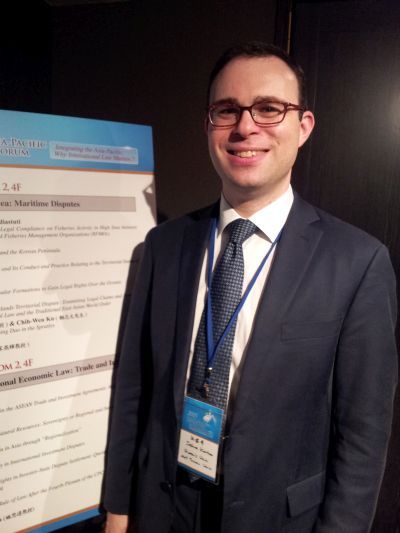
He may be on sabbatical, but newly tenured professor Joshua Karton is as busy as ever: presenting his research in London, teaching as part of the Queen’s Law Castle (BISC) program, and – among other things – conferring with international law colleagues at two major conferences in Taipei.
“In the last week, I had the opportunity to attend two quite different, but both excellent, conferences in Taipei,” Karton explains. “I am living in Taipei for all of this year while on leave from Queen’s. One of my main goals while living abroad is to develop stronger relationships with Asian law faculties, especially with an eye to developing research collaborations.”
The first conference, held by the Asian Law Institute, an international academic organization comprising almost 100 law faculties, welcomed Asian, North American and European academics. “Asian Law 2.0” featured hundreds of presenters and papers relating to all areas of law. “I personally attended interesting panels on judicial independence, constitutional reform, international arbitration, corporate governance, and commercial litigation,” Karton says. “One of the fun things about the conference was that many of the researchers are experts in legal systems other than the ones they were initially trained in. For example, the judicial independence panel involved four presentations, each on the judiciary of a different country: Indonesia, Uzbekistan, Singapore, and Thailand, but all four of the presenters were Japanese and teaching at universities in Japan.”
The second conference, the annual Asia-Pacific International Law Research Forum, was jointly organized by the International Law Association and the American Society of International Law and sponsored by the Republic of China (Taiwan) foreign ministry. “They pulled out all the stops,” Karton says. “The conference was exquisitely organized and attracted a lot of interest from the broader policy community. The main keynote speech was given by Ma Ying-jeou, the President of Taiwan. Representatives from various national representative offices and chambers of commerce were present for the keynote and for much of the conference. I had the opportunity to meet with the Director of the Canadian Trade Office, who attended my panel on international economic law issues.”
Some of Professor Karton’s recent research fuelled his presentation at both events. “I presented different parts of the same paper at both conferences. It has to do with the way that international arbitral tribunals apply international law in disputes between investors and states,” he says. “This is a politically hot issue recently, in particular relating to the Trans-Pacific Partnership (TPP), a large multilateral trade and investment treaty that is currently under negotiation. This treaty and others like it have become quite controversial, mostly because they permit investors to sue states directly and have the dispute decided by a private arbitral tribunal. A number of states have turned against investor-state arbitration recently; in Canada, the current government favours it but there is growing domestic political opposition. In Asia, several states have recently concluded trade and investment treaties that contain no arbitration provisions, and Indonesia announced just last month that it intends to repudiate all of its existing bilateral and multilateral investment treaties and renegotiate them with an eye to taking away the possibility of investor-state arbitration.”
Professor Karton’s work outlines a new perspective on investor-state arbitration – and represents a new academic area for him to work within. “My paper proposes a way of thinking about opposition to investor-state arbitration as fueled by uncertainty over the law that governs these disputes, and a model of international arbitral authority that dictates a particular approach to the governing law,” he explains. “The paper deals heavily in public international law and international legal theory—two areas in which I have little experience. I was apprehensive about the how the paper would be received, especially when I saw that the audience for my panel included the current Vice-President of the International Law Association, the Presidents of the American, Singaporean, Chinese, and Korean Societies of International Law, and the Canadian and Australian representatives in Taipei. But feedback on my presentation was quite positive, so I’m going to keep working on the paper and try to finish it by the end of the summer.”
“It was an exhausting week, but a successful one,” Karton says. “I came away with invitations to present future research related to the same project at upcoming symposia in Korea and Singapore, met senior professors in my area from all over Asia, and got to know some researchers my age who will hopefully be friends and contacts for years to come.”